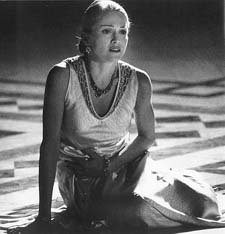Most people going to see the movie version of EVITA or renting the video for a snuggly Friday night probably never listened to the original recording by Andrew Lloyd Webber and Tim Rice, and are even less likely to have seen one of the early stage productions. What percentage only saw the movie? It’s hard to say– the movie was not a great success. But let’s make a conservative guess: 70%?
That’s the percentage of people who will get a slightly different picture of EVITA than the ones who heard the original recording or saw an early stage production (the newer stage productions are likely to be modeled on the movie version). The original was based fairly closely on the known historical facts about the life of Eva Duarte Peron, who rocketed to fame and power in Argentina in the 1930’s and 40’s and then died very young, of cancer, at the height of her influence, on July 26, 1952. The picture of Evita, as drawn in the original, is somewhat ambivalent. If she is admirable in any sense, she is admirable only for her remarkable ability to rise from almost nothing to one of the most powerful women in the world. But the original EVITA also makes it clear that the way she accomplished this feat was by whoring herself up the rungs of a ladder of influential men. And once she was married to the top dog in the military, Colonel Juan Peron, she became co-responsible for one of the most brutal and repressive regimes ever to rule Argentina. Snubbed by the aristocracy, she extrapolated bundles of money from everyone–including the labour unions– for her celebrated “Foundation Eva Peron”, and distributed unknown amounts (no books were kept) to the poor. Without a doubt, most of the money went into her own pockets, and to pay for jewels and dresses and her extravagant lifestyle as unofficial queen. It was a little like the Ontario lotteries, except that the lotteries steal from the poor instead of the rich. Eva stocked government officialdom with her relatives and cronies and severely punished any newspapers (including La Prensa) that dared to print critical commentary about her or her husband.

Now, I don’t mean to brag, or maybe I do, but not many of the people sitting in the movie theatres watching the Madonna version of EVITA know every single word of every song in the original. I do. And I immediately noticed many significant changes to the lyrics. Furthermore, I noticed a distinct trend. All of the changes functioned to improve the image of Evita herself. One of many examples: when an aristocrat observes that “statesmanship is more than entertaining peasants”, in the original, Evita snarls, “We shall see, little man!” In other words, yes, statesmanship is merely a matter of entertaining peasants. In the movie version, this line is given to a minor character. The result leaves open the possibility that Eva was more far-sighted than that.

The most disgusting change–because it is so patently self-serving–is the assignment of the beautiful aria, Another Suitcase in Another Hall, to Evita herself, when it was originally performed by Peron’s young mistress after Evita gave her the boot. This aria (remember, this is not a musical, but an opera, in spite of what the movie promoters tell you), had an important function in the original. It followed Evita’s initial seduction of Peron, during which she portrayed herself as a humble, innocent girl, who was so overwhelmed with Peron’s goodness and charm that she couldn’t help but throw herself at his feet. Then she nastily tosses Peron’s 14-year-old mistress out into the streets. The mistress sings a very plaintiff, introspective song about her dismal prospects. Interestingly– and in sharp contrast to Evita– she claims to be hard on the outside but confesses that, in her heart, she is devastated.
Time and time again, I’ve said that I don’t care/
that I’m immune to gloom/
That I’m hard, through and through/
But every time it matters, all my words desert me/
so anyone can hurt me/
and they do
In the original, you feel a twinge of your heartstrings for this poor, vulnerable girl. And your perception of Eva’s heartlessness and ruthlessness is enlarged. The contrast with the scheming Eva makes it plain that her seduction of Juan Peron is nothing more than a ploy to whore herself up another rung of the ladder.
In the movie version, Evita herself sings this song! This is a little like rewriting THE SOUND OF MUSIC and taking “Do Re Me” away from Julie Andrews and giving it to one of the Nazis. What a fun-loving, charming guy!
The reason for the change is obvious, and no, it’s not quite as sinister as you might think. Though the Peronista’s are still a force to be reckoned with in Argentina, I don’t think their reach extends all the way to Hollywood. No, it’s more banal than that. It’s Madonna’s Evita-like ego.
Madonna didn’t just get asked to do this picture: her representatives played an active role in getting her part, and, indeed, in getting the movie made (the property has been around for years but no-one was able to put the package together until recently). Strings were pulled. Everybody knows that the most captivating song in the show is the little aria sung by Peron’s mistress. Well, Madonna wanted that song for herself, and if she had to revise history a little in order to get it: so be it. In fact, all the other little changes also seem calculated to present Eva as less of a conniving slut and more like a poor girl who was merely ambitious and clever. As a result, many people will leave the theatre thinking that Eva Peron may have been a little rough around the edges, but maybe she was genuinely in love with Juan Peron, and maybe she really cared about the poor and dispossessed, and maybe her death was a real tragedy because Argentina was deprived of her gossamer presence as a result of it.
And you know, when you think about it, there are a lot of parallels with Madonna’s life. After all, hasn’t she been accused of the same things that Eva was accused of? Didn’t Madonna exploit her sex for money and power? And wasn’t Madonna reviled by some critics who didn’t really appreciate how sweet and vulnerable she really was, inside? And thus that obnoxious song they added, to ensure airplay for a “new” release: “You Must Love Me”. That’s all the poor girl wanted: to be loved.
The truth is that Peron was a Hitlerite and a fascist (Argentina was Germany’s very last ally), and Eva was a little dominatrix who abused her husband’s office for pure personal gain. The tragic results of her ascendancy to power–violence and social and economic instability–were still felt up until the 1970’s. The idea that she really wasn’t so bad is not a harmless delusion. When Bill Clinton talks about teaching Saddam Hussein a lesson, and when Jesse Helms spouts off about Castro, and when Le Pen in France denounces foreigners, and when Bouchard talks about “humiliation”, we are hearing echoes of the same demagogic impulses. EVITA could have done us all a favour by showing us, unflinchingly, just how attractive an evil political philosophy can make itself.
By the way, as a movie, EVITA isn’t great either, though it’s not as bad as some reviewers have decreed. And Madonna’s performance is relatively faultless: the girl does have a set of pipes. But there are too many moments where the singers don’t really know what to do with themselves. See Jesus Christ Superstar for an example of what they could be doing.
One last note: when is someone going to do an opera based on the story of Eva’s corpse? It was embalmed remarkably well and apparently remained quite life-like for years afterwards. It was stolen by the government when it feared Juan Peron would use it to regain political power, after he was turfed in 1955. After years of chaos, Peron was invited to return and he did so, but only after her corpse, which had been hidden in a crypt in Italy, was returned to him. He kept it on a living room table and his third wife, Isabel, (Eva was wife #2) dusted it every day for him, when she wasn’t occupied with her duties as vice-president! Isabel, eventually achieved what even Eva had not been able to achieve: the Vice-Presidency. In July 1974, upon the death of her husband, she became President of Argentina.
Her administration was an unmitigated disaster, as Eva’s likely would have been.
So how about it, composers?
Update 2009
Updated January 16, 2009
The real “Evita” in action, leading a rally (left).
Not the first revision… when introduced in Europe, the musical was controversial — did it glorify a woman associated with Fascism? When brought to America by producer Hal Prince, the authors (Rice and Webber) apparently agreed to develop a character based on Che Guevara to “balance” the role of Eva. He tells the audience what to think… a bad development artistically, if not morally. You can hear it in his songs– let me frame it for you, so you understand just how bad she is. Or good. Or both.
Still, the best lines in the show are Che’s reaction to the monumental funeral of Evita: “Oh what a circus, oh what a show….”
On the other hand… keep in mind that in the process of extorting millions of dollars from workers, the rich, and corporations to give to the poor (in a manner that suggested to them that they were personal gifts from Eva’s own pockets), Eva was merely practicing a form of socialism that benefited families and individuals who managed to come into her orbit. The actual numbers helped probably pale in comparison to the numbers helped by, say, an increase in the minimum wage, which applies to everyone, regardless of whether they have the opportunity to personally thank Evita. It’s a bit like a socialist lottery. In this context, it’s hard to have any sympathy for the upper classes who thought that politics was more than “entertaining peasants”.


